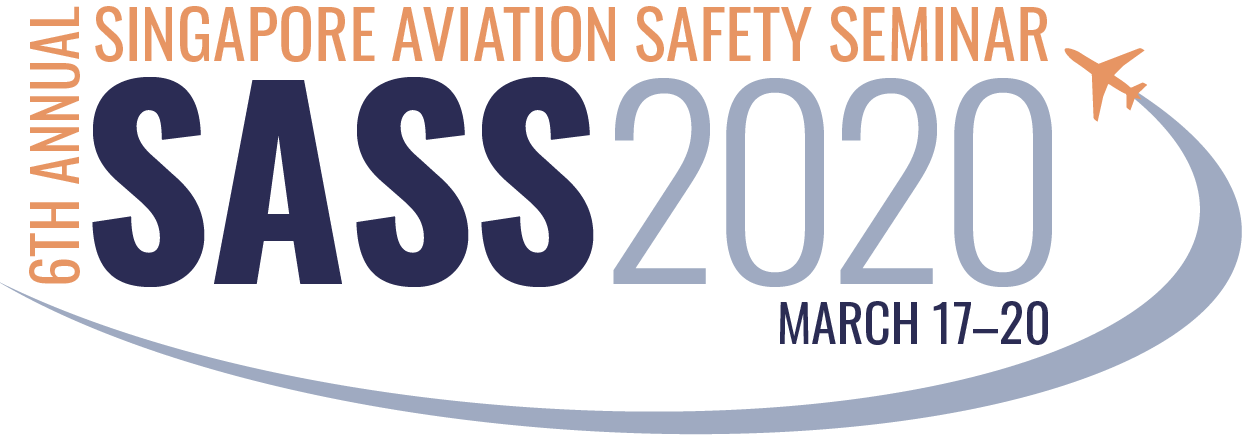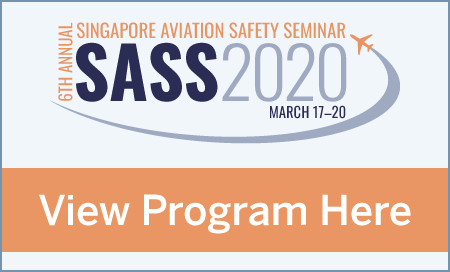6th annual Singapore Aviation Safety Seminar

Summit topics
Day 1 – Tuesday, March 17 |
| Panel Session I – Enhancing Aviation Safety with Data Analytics By 2025, more than 38,000 new aircraft will be in operation worldwide, producing many times more data than the previous generation aircraft. The proliferation of sensors on modern aircraft has led to a 60-fold increase in the number of aircraft parameters collected from each flight. In order to leverage on the vast amount of data, the aviation community needs to be equipped with the necessary technology, knowledge and process to efficiently generate insights and formulate actions to enhance safety. In this session, speakers will look into the benefits and challenges on how to utilize data analytics to ensure safer skies. |
| Session II – Data-driven Fatigue Risk Management The aviation industry provides one of the safest modes of transportation in the world. Nevertheless, a safety critical industry must actively manage hazards with the potential to impact safety. Crew member fatigue is a hazard that predictably degrades various types of human performance and can contribute to aviation accidents and serious incidents. While fatigue cannot be eliminated, it can definitely be better managed to enhance aviation safety. An effective Fatigue Risk Management Systems (FRMS) is data-driven and routinely collects and analyzes information, and reports related to aviation personnel who are required to be alert to perform at a safe level operationally. This will help control risk associated with both transient and cumulative fatigue. In this session, speakers will share an overview and best practices in data-driven fatigue risk management. |
| Session III – Safety Management Systems Implementation in Perspectives Safety Management Systems (SMS) provide a structured management approach to control safety risks in operations. To effectively manage risk, all aviation products and service providers including, aircraft operators, manufacturers, aerodromes, maintenance companies, aircraft refuellers, caterers, baggage and ground handlers must adopt SMS. In this session, speakers will discuss on current status of SMS in aviation, the benefits of SMS and the challenges faced by the aviation community in implementing SMS. |
Day 2 – Wednesday, March 18 |
| Panel Session IV – Integration of manned and unmanned aircraft in controlled airspace The early days of any new industry are often the most confusing and hardest times to predict the long-term trajectory of the technology and the business models. One thing is certain: The expectations for safety will be even higher in the future evolution of flying machines, whether with or without humans controlling an aircraft from the air. So how does the industry plan for safety without any evidence of that the performance levels might be as the industry launches drones and urban air mobility (UAM). The advent of drones has presented a gamut of unprecedented complications to the safety of urban air transportation system which needs to be accompanied by a safe, sustainable and convenient solution. Can we indeed plan for something much better than current commercial aviation safety performance levels? |
| Session V – High Risk Accident Categories Controlled Flight into Terrain (CFIT), Loss of control in flight (LOC-I), mid-air collision, runway excursion and runway incursion related incidents or accidents are identified as the top safety priorities of ICAO in the 2020 – 2022 edition of the Global Aviation Safety Plan (GASP). These three categories contributed to a large portion of air incidents leading to a considerable amount of fatalities, especially in the APAC region. In this session, speakers will discuss today’s challenges for the remaining causes for these high-risk accident categories, as well as how we can increase the safety levels in APAC region. |
| Session VI – Licensing of Pilots, Cabin Crew and Air Traffic Controllers Competence of aviation personnel is of paramount importance in managing aviation safety. The regulators’ requirements for licensing of many operational staff is meant to assure the traveling public that trusted and capable individuals are used for key positions. From Pilots, Cabin Crew, aircraft maintenance engineer and Air Traffic Controllers, we depend on these professionals to make the right decisions, and these ranges from those routine and easy to execute to the extremely challenging situations where lives could be at stake. Yet how we set the requirements and how we test for those seeking to fill these positions perhaps should be an ever changing and improving standard. This session discusses how we can make these requirements fair which will eventually lead to equipping personnel with the right skills necessary for the job. |
| Session VI – The Role of Human Factors in Improving Aviation Safety Despite rapid gains in technology, humans are ultimately responsible for ensuring operational success and safety in the aviation industry. They must continue to be knowledgeable, flexible, dedicated, and efficient while exercising good judgment. At the same time, the industry continues to make heavy investments in training and advanced equipment that have long-term implications on human interaction and performance. A sound scientific basis is necessary for assessing human performance implications in design, training, and procedures to continue to improve aviation safety. In this session, speakers will discuss on various human factors initiatives and developments. |
Day 3 – Thursday, March 19 |
| Session VIII – Flight Crew Training How can we, by regularly revisiting the training needs based on operational results and increase the value of training by recognizing all the areas to make proper assessments. When we know what we need to cover in the training of our cadets, instructors and captains, who often have different learning styles that can be different across the generations, how do we make a real impact to the capabilities of flight crews through the newest changes to our training curriculum. In this session, the speakers will share the latest developments in flight crew training to improve flight safety. |
| Session VIII – Technology Assisted Maintenance in Aviation MRO is a significant contributor to aircraft operating costs, flight delays and cancellations. As the global aerospace engineering industry gears up to adopt emerging technologies, OEMs, MROs and suppliers have adopted a range of innovative technologies and techniques such as robotics, virtual/augmented reality, additive manufacturing etc. to aid aircraft maintenance. In this session, speakers will discuss how technologies will enable MROs to reduce cost, turnaround time and optimize resources. |
| Session IX – Automation in Flight Deck – Blessing or Danger? Flight Operations Breakout Track Pilots operating modern aircraft depends on automation for safe, efficient and effective operation. However, recent accidents reminded us that automation may work against us and resulted in the aircraft entering a state where it cannot return to safe flight Automation is meant to reduce workload, so the pilot may focus on other important tasks but a poorly designed automation may result in the pilot losing his situation awareness and creates a huge increase in workload if it fails to work as designed. Are we in an era of automation dependency? Are we able to fully control an aircraft safely should some critical automation system fails? |
| Session IX – Aircraft Health Monitoring Systems Maintenance and Engineering Breakout Track Aircraft Health Monitoring Systems (AHMS) utilize multi-sensors information integration technology to diagnose systematic failure and are at the heart of predictive maintenance. AHMS allow significant savings in maintenance and operational costs. Engine OEMs and MRO have been developing engine health-monitoring solutions for some time, but aircraft OEMs are now catching up as they recognize the power of data to drive aftermarket revenues. This session discusses the latest technologies and advancement pertaining to AHMS and their benefits. |
| Session X – Cabin Safety Improvements Flight Operations Breakout Track The challenges related to cabin safety are continuously evolving and require ongoing improvements. The proliferation of Portable Electronic Devices (PEDS) carried by passengers and crew has led to a recent revision of cabin crew fire-fighting procedures to mitigate the risk of inflight fires. There is also a marked increase in air rage incidents during flights likely caused by physiological or psychological stresses linked to air travel. This has resulted in procedures being developed to manage such unruly passengers and considerations in the flight deck to divert flights as necessary. In this session, speakers will share the latest initiatives to improve cabin safety. |
| Session X – Digital Transformation in Aircraft Maintenance Maintenance and Engineering Breakout Track Technology has changed the way that aircraft maintenance is carried out in every way: predicting faults, troubleshooting, training and managing information that supports maintenance. Real-time capture of MRO transaction data at source, deriving insights using internet of things (IoT), artificial intelligence (AI) and machine learning (ML) and innovation to exploit the insights forms the foundation of digital transformation. In this session, the speakers discuss how blockchain, AI, ML, IoT can benefit MRO and share their digital transformation journey. |
| Panel Session XI: Aviation Mental Health The importance of managing flight crew mental health has been thrusted to the forefront of aviation mental health after the crash of LAM Flight 470 and Germanwings Flight 9525. Unfortunately, there is a rising incidence of mental health problems in the population in general and depression is one of the most common psychiatric disorders, with a progressive incidence rate. More serious mental health problems, such as psychotic disorders, can be difficult to predict and their diagnosis can also be difficult in the absence of clear psychotic symptoms. The mental health of flight crew, where their professional activity can affect flight safety, must therefore be a priority for the international aviation community. State CAAs and airlines have introduced Peer Support Program (PSP) and Human Intervention Motivation Studies (HIMS) to help those who are affected, so they may continue to perform their duties in a safe manner. In this session, speakers will discuss an overview of aviation mental health issues |

